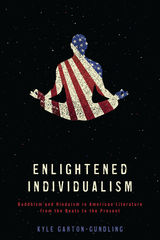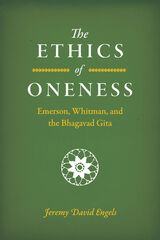9 start with E start with E

This “enlightened individualism” uses Buddhist and Hindu philosophy to reframe American freedom in terms of spiritual liberation, and it also reinterprets Asian teachings through Western traditions of political activism and countercultural provocation. Garton-Gundling argues that even though works by Kerouac, Walker, Kingston, and others wrestle with issues of exoticism and appropriation, their characters are also meaningfully challenged and changed by Asian faiths. These literary adaptations, then, can help Americans reenvision individualism in a more transcendent and cosmopolitan context.

The authoritative new translation of the epic Ramayana, as retold by the sixteenth-century poet Tulsidas and cherished by millions to this day.
The Epic of Ram presents a new translation of the Rāmcaritmānas of Tulsidas (1543–1623). Written in Avadhi, a literary dialect of classical Hindi, the poem has become the most beloved retelling of the ancient Ramayana story across northern India. A devotional work revered and recited by millions of Hindus today, it is also a magisterial compendium of philosophy and lore, and a literary masterpiece.
The seventh volume completes Tulsidas’s grand epic. Ram reunites with his family in Ayodhya and assumes the throne, beginning his long, utopian reign. He also delivers ethical and spiritual teachings to his brothers and subjects. Then, a fascinating narrator—an immortal sage embodied in a lowly crow—reflects on Ram’s life story while recounting how he acquired wisdom, despite setbacks, on his own mystical and devotional quest across aeons.
This new translation into free verse conveys the passion and momentum of the inspired poet and storyteller. It is accompanied by the most widely accepted edition of the Avadhi text, presented in the Devanagari script.

The authoritative new translation of the epic Ramayana, as retold by the sixteenth-century poet Tulsidas and cherished by millions to this day.
The Epic of Ram presents a new translation of the Rāmcaritmānas of Tulsidas (1543–1623). Written in Avadhi, a literary dialect of classical Hindi, the poem has become the most beloved retelling of the ancient Ramayana story across northern India. A devotional work revered and recited by millions of Hindus today, it is also a magisterial compendium of philosophy and lore, and a literary masterpiece.
In the sixth volume, Ram and his devoted allies fight the army of Ravan in a climactic battle that ends with the death of the demon king. Ram reunites with Sita, and—after her fidelity is confirmed by the burning of an illusory double—they board a flying palace to return to the city of Ayodhya, where Bharat has been waiting anxiously as his brother Ram’s fourteen-year exile nears its end.
This new translation into free verse conveys the passion and momentum of the inspired poet and storyteller. It is accompanied by the most widely accepted edition of the Avadhi text, presented in the Devanagari script.

The authoritative new translation of the epic Ramayana, as retold by the sixteenth-century poet Tulsidas and cherished by millions to this day.
The Epic of Ram presents a new translation of the Rāmcaritmānas of Tulsidas (1543–1623). Written in Avadhi, a literary dialect of classical Hindi, the poem has become the most beloved retelling of the ancient Ramayana story across northern India. A devotional work revered and recited by millions of Hindus today, it is also a magisterial compendium of philosophy and lore and a literary masterpiece.
Volume 5 encompasses the story’s three middle episodes—Ram’s meetings with forest sages, his battles with demons, the kidnapping of his wife, his alliance with a race of marvelous monkeys—and climaxes with the god Hanuman’s heroic journey to the island city of Lanka to locate and comfort Sita.
This new translation into free verse conveys the passion and momentum of the inspired poet and storyteller. It is accompanied by the most widely accepted edition of the Avadhi text, presented in the Devanagari script.

The authoritative new translation of the epic Ramayana, as retold by the sixteenth-century poet Tulsidas and cherished by millions to this day.
The Epic of Ram presents a new translation of the Rāmcaritmānas of Tulsidas (1543–1623). Written in Avadhi, a literary dialect of classical Hindi, the poem has become the most beloved retelling of the ancient Ramayana story across northern India. A devotional work revered and recited by millions of Hindus today, it is also a magisterial compendium of philosophy and lore and a literary masterpiece.
The third volume details the turbulent events surrounding the scheming of Prince Ram’s stepmother, who thwarts his installation on the throne of Avadh. Ram calmly accepts fourteen years of forest exile and begins his journey through the wilderness accompanied by his wife, Sita, and younger brother Lakshman. As they walk the long road, their beauty and serenity bring joy to villagers and sages dwelling in the forest.
This new translation into free verse conveys the passion and momentum of the inspired poet and storyteller. It is accompanied by the most widely accepted edition of the Avadhi text, presented in the Devanagari script.

The authoritative new translation of the epic Ramayana, as retold by the sixteenth-century poet Tulsidas and cherished by millions to this day.
The Epic of Ram presents a new translation of the Rāmcaritmānas of Tulsidas (1543–1623). Written in Avadhi, a literary dialect of classical Hindi, the poem has become the most beloved retelling of the ancient Ramayana story across northern India. A devotional work revered and recited by millions of Hindus today, it is also a magisterial compendium of philosophy and lore and a literary masterpiece.
The fourth volume turns to the story of Ram’s younger half-brother Bharat. Despite efforts to place him on the throne of Avadh, Bharat refuses, ashamed that Ram has been exiled. In Bharat’s poignant pilgrimage to the forest to beg the true heir to return, Tulsidas draws an unforgettable portrait of devotion and familial love.
This new translation into free verse conveys the passion and momentum of the inspired poet and storyteller. It is accompanied by the most widely accepted edition of the Avadhi text, presented in the Devanagari script.

The authoritative new translation of the epic Ramayana, as retold by the sixteenth-century poet Tulsidas and cherished by millions to this day.
The Epic of Ram presents a new translation of the Rāmcaritmānas of Tulsidas (1543–1623). Written in Avadhi, a literary dialect of classical Hindi, the poem has become the most beloved retelling of the ancient Ramayana story across northern India. A devotional work revered and recited by millions of Hindus today, it is also a magisterial compendium of philosophy and lore and a literary masterpiece.
This volume presents Tulsidas’s grand introduction to the Ram story, replete with philosophical and theological meditations and tales of gods, sages, and royalty. Here, the stage is set for the advent and divine mission of Ram.
This new translation into free verse conveys the passion and momentum of its inspired poet and storyteller. It is accompanied by the most widely accepted edition of the Avadhi text, presented in the Devanagari script.

The authoritative new translation of the epic Ramayana, as retold by the sixteenth-century poet Tulsidas and cherished by millions to this day.
The Epic of Ram presents a new translation of the Rāmcaritmānas of Tulsidas (1543–1623). Written in Avadhi, a literary dialect of classical Hindi, the poem has become the most beloved retelling of the ancient Ramayana story across northern India. A devotional work revered and recited by millions of Hindus today, it is also a magisterial compendium of philosophy and lore and a literary masterpiece.
In the second volume, prompted by the tyranny of the demon king Ravan, Ram decides to be born on earth. Tulsidas lovingly details Ram’s infancy, childhood, and youthful adventures, the winning of Princess Sita as his bride, and the celebration of their marriage.
This new translation into free verse conveys the passion and momentum of its inspired poet and storyteller. It is accompanied by the most widely accepted edition of the Avadhi text, presented in the Devanagari script.

In The Ethics of Oneness, Jeremy David Engels reads the Bhagavad Gita alongside the works of American thinkers Ralph Waldo Emerson and Walt Whitman. Drawing on this rich combination of traditions, Engels presents the notion that individuals are fundamentally interconnected in their shared divinity. In other words, everything is one. If the lessons of oneness are taken to heart, particularly as they were expressed and celebrated by Whitman, and the ethical challenges of oneness considered seriously, Engels thinks it is possible to counter the pervasive and problematic American ideals of hierarchy, exclusion, violence, and domination.
READERS
Browse our collection.
PUBLISHERS
See BiblioVault's publisher services.
STUDENT SERVICES
Files for college accessibility offices.
UChicago Accessibility Resources
home | accessibility | search | about | contact us
BiblioVault ® 2001 - 2024
The University of Chicago Press









